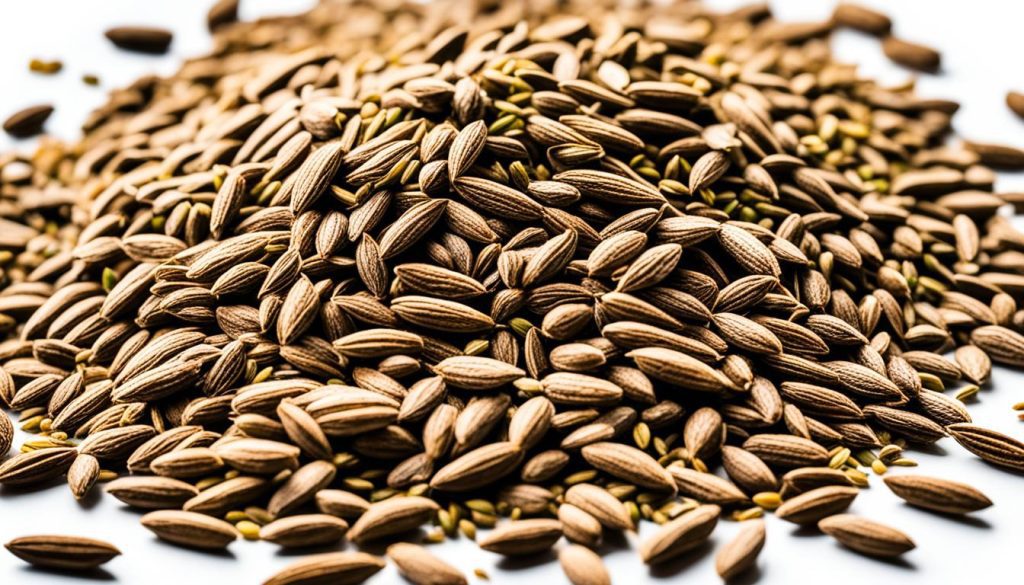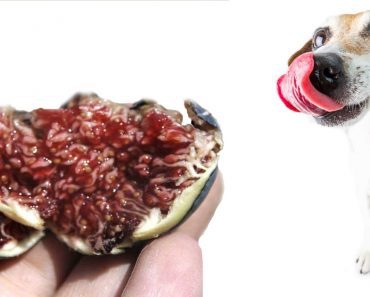Hello there! Are you a pet owner wondering if it’s safe for your furry friend to eat cumin? Well, you’ve come to the right place. Today, I’m going to tell you all about cumin, its benefits, and whether it’s suitable for dogs. Making sure our pets have a healthy and balanced diet is crucial, so let’s dive right in!
Can Dogs Eat Cumin? Yes, but only in small quantities.
- Cumin is a popular spice used in cooking, but dogs should only consume it in small amounts.
- Consult with a veterinarian before adding cumin or any other spices to your dog’s diet.
- Cumin has anti-inflammatory properties and can be beneficial for joint pain and digestive health in dogs.
- While cumin is generally safe, large doses can cause digestive issues in dogs.
- It’s important to control the amount of cumin your dog consumes and to avoid giving it to dogs with specific health conditions or allergies.
What Is Cumin?
Cumin is a spice derived from the seeds of a flowering plant in the parsley family. It has an earthy flavor and is commonly used in various cuisines around the world, particularly in Middle Eastern dishes. Cumin is rich in essential oils that give it its taste and aroma. While it is related to parsley and coriander, it should not be confused with turmeric, which contains a different active ingredient called curcumin.
Cumin is a versatile spice that adds depth and complexity to many dishes. Its distinct flavor and aroma make it a popular choice in both savory and sweet recipes. Cumin seeds are small and oblong in shape, ranging in color from brown to amber. These seeds are usually toasted or ground before being used in cooking.
What sets cumin apart from other spices is its unique combination of flavors. It has a warm, earthy taste with hints of bitterness and sweetness. The essential oils found in cumin are responsible for its powerful aroma and flavor profile.
In terms of pet health and dog nutrition, it is important to note that cumin should only be given to dogs in small amounts. While it can be a flavorful addition to their diet, excessive consumption of cumin can lead to digestive issues. Therefore, pet owners should consult with their veterinarian before including cumin or any other spices in their dog’s meals.
- Cumin is a spice derived from a flowering plant.
- It has an earthy flavor and is commonly used in various cuisines.
- Cumin is rich in essential oils that give it its taste and aroma.
- It should not be confused with turmeric, which contains curcumin.
- Cumin can be a flavorful addition to a dog’s diet, but in controlled portions.
Health Benefits of Cumin
Cumin, a commonly used spice in cooking, offers several potential health benefits for both humans and dogs. This versatile spice contains essential oils and compounds that contribute to its anti-inflammatory properties, making it a natural remedy for joint pain and other inflammatory conditions in dogs.
Moreover, cumin is packed with dietary fiber, which can be beneficial for dogs struggling with irregular bowel movements. Adding a small amount of cumin to your dog’s diet can help regulate their digestive system and promote overall gastrointestinal health.
In addition to its anti-inflammatory and digestive benefits, cumin is a rich source of vitamin E. This essential nutrient plays a crucial role in maintaining healthy skin, hair, and coat in dogs. By incorporating cumin into your dog’s diet, you can help support their skin and coat health, leaving them looking and feeling their best.
While the health benefits of cumin for dogs are still being researched, it is crucial to consult with a veterinarian before introducing it into their diet. They can provide personalized advice based on your dog’s specific needs and ensure that cumin is safe and suitable for them.
- Cumin can stimulate digestion and relieve gas in dogs when used in moderation.
- The antioxidants found in cumin may help support your dog’s immune system.
- A small amount of cumin can improve the flavor and aroma of your dog’s meals.
Remember, while cumin can offer health benefits to dogs, it should always be given in controlled portions. Consulting with a veterinarian is essential to ensure your furry friend’s safety and well-being when incorporating cumin or any other new foods or spices into their diet.
Can Dogs Eat Cumin?
Dogs can safely consume small amounts of cumin, making it one of the safe spices for dogs. However, it is essential to exercise moderation when introducing cumin into your dog’s diet. Large doses of cumin can have adverse effects on a dog’s health, including upset stomach and heart palpitations.
Cumin is a highly aromatic and strong-tasting spice, so only a small amount is needed to add a flavorful touch to your dog’s food. It is important to control the quantity of cumin your dog consumes to ensure their well-being.
If your dog has preexisting health conditions, such as being on blood thinners or having kidney problems, it is best to avoid giving them cumin or any foods spiced with cumin. Consulting with a veterinarian is always recommended before introducing new spices or ingredients into your dog’s diet.
Can Dogs Eat Cumin Seeds?
Dogs can safely eat cumin seeds, which can be sprinkled on their food to add dietary fiber and nutrients to their diet. Cumin seeds have bursts of flavor compared to cumin powder, and some dogs may prefer them.
Adding cumin seeds to your dog’s diet can provide a natural source of dietary fiber, which is essential for maintaining a healthy digestive system. Dietary fiber helps regulate bowel movements and can prevent constipation or diarrhea in dogs.
Cumin seeds also contain trace amounts of vitamins and minerals that can contribute to your dog’s overall nutrition. However, it is important to note that cumin seeds should only be given in moderation. Too many cumin seeds can cause digestive issues such as upset stomach or bloating.

If you are considering adding cumin seeds to your dog’s diet, it is best to consult with a veterinarian. They can provide guidance on the appropriate portion size based on your dog’s breed, size, and overall health. It is also important to monitor your dog for any signs of digestive discomfort or adverse reactions when introducing cumin seeds or any other new food to their diet.
Is Cumin Good for Dogs?
When it comes to cumin, a popular spice used in various cuisines, it can have some benefits for dogs when given in small amounts. Cumin has the potential to boost their immune system, aid in weight loss, and regulate blood sugar levels. These properties can contribute to their overall health and well-being.
However, it is crucial to exercise caution and avoid giving dogs large amounts of cumin. While some spices can be beneficial, excessive consumption can lead to digestive issues in dogs. Therefore, it’s important to moderate their intake of cumin to protect their sensitive stomachs and ensure their well-being.
Dogs with preexisting health conditions, sensitive stomachs, or multiple food allergies should not be given cumin without consulting a veterinarian beforehand. Professional advice is essential in determining whether cumin is suitable for your dog’s specific dietary needs.
As with anything new, it is always best to err on the side of caution and seek professional advice before introducing any new foods or spices to your dog’s diet. Proper guidance will help ensure that their health and nutritional needs are met without any adverse effects.
Other Spices to Avoid for Dogs
While cumin is generally considered safe for dogs, there are certain spices that can be harmful to them. It’s important to be aware of these toxic foods for dogs to ensure their well-being and maintain their optimal pet health.
- Nutmeg: This spice can cause neurological issues, including tremors and seizures, if ingested by dogs. It is essential to keep products containing nutmeg out of your dog’s reach.
- Cinnamon: Although small amounts of cinnamon are generally safe, excessive consumption can irritate the mouth and digestive system, causing discomfort and diarrhea. It is best to avoid feeding your dog foods or treats with cinnamon.
- Paprika: Paprika may lead to gastrointestinal upset in dogs and cause stomach pain, vomiting, and diarrhea. It is advisable to keep dogs away from dishes seasoned with paprika.
- Table Salt: While a minimal amount of salt is necessary for a dog’s diet, excessive salt intake can lead to sodium ion poisoning. This can result in increased thirst, dehydration, nausea, and even seizures. It is crucial to keep salty snacks away from your furry friend.
- Onion Powder: Onions and garlic contain compounds that can cause damage to a dog’s red blood cells, leading to anemia. Avoid feeding your dog any foods or treats seasoned with onion powder as it increases the risk of toxicity.
If you suspect your dog has ingested any harmful spices, it is best to contact a veterinarian for guidance. Remember, maintaining a balanced and nutritious dog nutrition is essential for your pet’s overall health and well-being.

Conclusion
While cumin can provide potential health benefits for dogs, it should be given in controlled portions and with caution. Dogs can safely consume small amounts of cumin, as long as it is not excessive. It is always advisable to consult with a veterinarian before adding any new foods or spices to your dog’s diet to ensure their safety and well-being.
Remember, moderation is key when it comes to incorporating cumin or any other spices into your dog’s meals. Monitoring your dog for any signs of digestive issues or allergic reactions is crucial. It is important to prioritize their nutrition and overall health by providing a balanced and appropriate diet.
When it comes to pet health and food safety for dogs, being knowledgeable about the impact of spices on their well-being is essential. By making informed choices, consulting with professionals, and observing your dog’s reactions, you can ensure they receive the appropriate nutrition and stay healthy.






